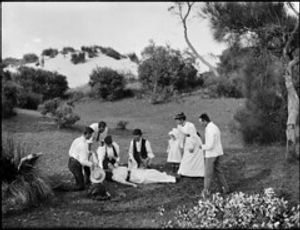transvic reflections
published onA few reflections and notes from last week's Transmedia Victoria event...
So what IS transmedia? It was clear that the form and definition remain quite loose still (which is good). Here are a few pointers...
- 'cool internet based scavenger hunt kinds of things'
- alternate reality entertainment
- overlay of entertainment space onto the real world
- interacts with you via phone, email, browser and the street where you live
- puts audience in the story
- brings a story to you
- story surrounds the audience
- non-linear : newly found evidence builds on from past
- about enhancing experiences, not repeating them
- dynamic/ engaging
Tassos Stevens from Coney spoke of the principles of play:
- adventure
- reciprocity and
- loveliness
It struck me that there is little of any of them in adult education. How do we reinstate the joy of learning and creativity?
Flint Dille said 'treat me like an interactive object' (nice - a shame many educators are simply megaphones), and spoke of media franchise (franchise being defined as intellectual property'). The key elements of a franchise:
- hero
- home
- vehicle
- friends and allies
- enemies
- iconic gadgets
- a unique world
OK am lost a bit here with any possible cross over to education....
Quote: 'if you want to keep control of your franchise, don't sell it to anyone'
There was a constant allusion to 'production' and 'rights management'; how do we put the strategy in the hands of learners and teachers? Key concerns were who owns what, in what territories, for how long, what is it worth, is revenue shared?
Quote: 'It is the 'inconsistencies' in a story that makes an audience feel 'smart''
When asked about the role of a franchise in SIMS Flint responded that SIMS = simulation which is not a game. A simulation aims to recreate something real.
It strikes me that the storytelling/ narrative in a simulation still exists but is placed in the hands/ minds of the participants.
Steve Peters introduced himself as 'experience designer' - nice term for teachers/ learning designers I thought
Steve listed the roles needed for a production to be:
- writer/s
- experience designer/s
- producer/s
- graphic artists
- IT/programmers
- QA testers
Props in a story can include any manner of things including:
- foreign language
- digital files
- old documents
- artifacts
- music lyrics
- sky-writing
- hidden USB drives
- maps & GPS
- live events
- architectural projections
- receipts
- Facebook pages
- clothing
- games
- action figures
The ability to react to audience moves or sticking points requires a lot of tap-dancing Steve said - 20% of the design needs to be left open to respond.
Andra Sheffer spoke of online staying power. Only 3 minutes for adults but over 10 mins for kids. She urged us to design what makes sense not whats cool, that simpler is often better and that the transmedia element should be tagged onto other platforms - ie. that transmedia design must be integrated.
Sound familiar?
She also stressed that 'there are no more borders - think WORLD' and that 'promotion never ends with digital projects'
Clear relevance for education....
Kerrin McNeil from Hoodlum spoke of 'making stories irresistible' (read LEARNING here), that 'life is multi-platform' (and so should be learning), that 'audiences are 'moved' when content is personalised' (again relevant for LEARNING) and that we need to remember that audiences (and learners) want to interact in different ways - watch, play, share.
Final thoughts.......
If transmedia has a place in learning and teaching it's potential will need to be transferred into the hands of 'normal' people (in the same way we did with digital stories). Scaffolds are needed to guide the process and support the integration of media. We need to harness the transmedia-like elements of good teaching practice and extend them. Community projects are a good stepping stone/intro but I could not get a sense of anything on the day that was not being 'produced' (done for/to audiences). My big take-away .... we need to strengthen the fun/joy, problem solving, choice and multimodal aspects of education.

[CC FlickR image from Powerhouse Museum Collection]